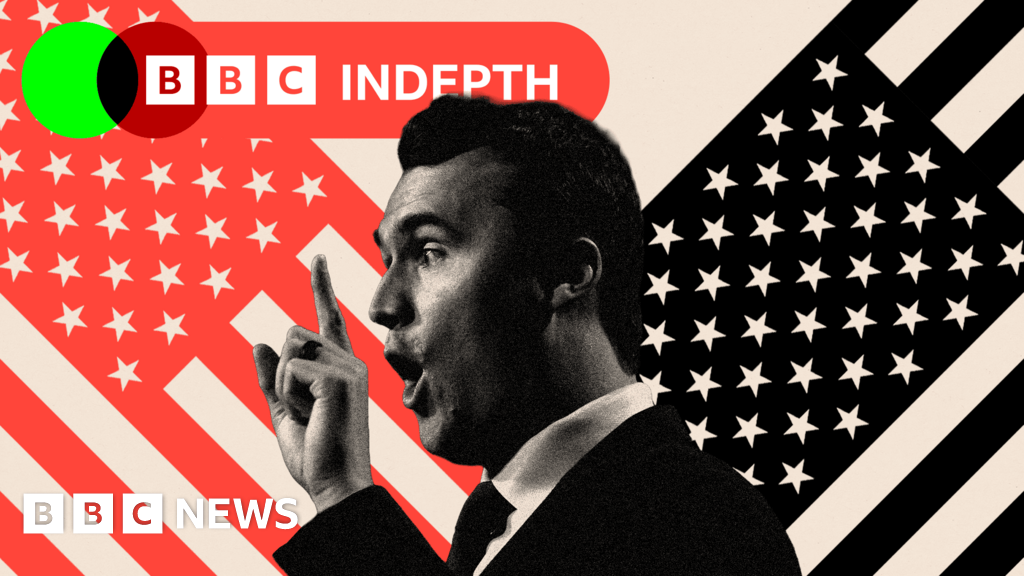
The US is at a dangerous crossroads after Charlie Kirk shooting

America at a Crossroads: Reflections on the Charlie Kirk Shooting
A Week of Violence and Division
In the wake of a tragic assassination that has rattled the nation, the conversation surrounding America’s political climate has intensified. The recent killing of Charlie Kirk, a prominent conservative figure, has raised urgent questions about the country’s capacity to overcome its growing divisions. Katty Kay, a US Special Correspondent for BBC, reflects on the current state of American society, suggesting that the nation finds itself at a perilous crossroads.
As the governor of Utah, Spencer Cox, called for a reduction in political hostility, many Americans remain skeptical about the likelihood of achieving unity. The prevailing sentiment, as expressed by Kay, is that the path toward reconciliation appears bleak, especially given the historical context of America’s response to violence.
Historical Context of Political Violence
Political violence is not a new phenomenon in the United States. The country has a long history of such incidents, stretching back over 160 years. The assassinations of President John F. Kennedy and his brother, Robert Kennedy, alongside the murders of civil rights leaders during the 1960s, serve as stark reminders of the turbulent times that have shaped American politics. The 1970s saw multiple assassination attempts on public figures, including President Gerald Ford. More recently, former President Donald Trump himself faced assassination attempts, underscoring the persistent threat of political violence.
However, what sets this current era apart, according to Governor Cox, is the role of social media in amplifying divisions. He has expressed concern that social media platforms have contributed significantly to the climate of hostility, suggesting that they have acted as catalysts for violence and radicalization.
The Role of Social Media
Governor Cox’s remarks highlight a growing unease about the influence of social media on public discourse. He has described the impact of these platforms as a “cancer” on American society, arguing that they have exacerbated divisions rather than fostering constructive dialogue. While many tech companies have remained silent on the issue, some prominent figures, such as Elon Musk, have weighed in, attributing Kirk’s assassination to broader societal issues stemming from extreme political ideologies.
The complexities of social media’s effect on political discourse are evident in the experiences of young political activists. Kaitlin Griffiths, a 19-year-old president of Utah State University’s chapter of Turning Point USA, lamented the inability to engage in meaningful conversations across political lines, calling the current state of discourse “tragic.”
Divergent Political Narratives
In the immediate aftermath of Kirk’s death, the political landscape quickly polarized. Different factions have sought to frame the narrative surrounding the assassination to fit their agendas. Many on the left have focused on the potential radicalization of the shooter through online communities, while those on the right have speculated about possible conspiracies. This divergence in narratives reflects a broader trend in American politics, where reconciliation and healing often take a backseat to partisan posturing.
Experts studying extremism suggest that the current divisions may not be best understood through a left-right lens. Rachel Kleinfeld, a senior fellow at the Carnegie Endowment for International Peace, argues for a more nuanced approach that emphasizes the underlying causes of societal ungovernability. She advocates for a collective effort to “turn down the temperature” of political discourse.
The Need for Reconciliation
The question of whether America can overcome its divisions remains open. David Drucker, a political writer, notes that a leader with a strong commitment to reconciliation is essential for fostering unity. He emphasizes that both political parties must agree to halt the cycle of blame and animosity. Historically, it has often been the role of the presidency to facilitate such healing, but the current political climate raises doubts about the feasibility of this approach.
Former President Trump has taken a combative stance following Kirk’s assassination, framing the event as a manifestation of broader issues related to the “radical left.” His remarks have drawn criticism for perpetuating division rather than promoting unity. This approach contrasts sharply with Governor Cox’s call for a more compassionate and community-oriented response.
Looking to the Future
Despite the grim realities of the present, some voices express hope for a more unified future. Former Congressman Joe Scarborough reflects on past periods of political strife, suggesting that the nation has the capacity to move beyond its current challenges. Similarly, Democratic Senator Raphael Warnock acknowledges the progress made on issues like race, emphasizing that the story of America is one of resilience and growth.
Historian Ken Burns offers a sobering perspective on the cyclical nature of history, cautioning against oversimplified narratives that suggest history repeats itself. Instead, he highlights the importance of recognizing the unique circumstances that define each era of American life.
Conclusion
As the nation grapples with the aftermath of Charlie Kirk’s assassination, the path forward remains uncertain. The interplay of social media, political polarization, and historical context presents formidable challenges to achieving reconciliation. Yet, amidst the turmoil, there are voices advocating for a return to civil discourse and community engagement. Whether America can navigate this dangerous crossroads will depend on the collective willingness to confront the underlying issues that have driven the country apart.
Key Facts
– Charlie Kirk, a notable conservative figure, was recently assassinated, prompting national reflection on political violence.
– Utah Governor Spencer Cox called for a reduction in political hostility, highlighting the role of social media in exacerbating divisions.
– The historical context of political violence in the U.S. includes notable assassinations dating back to the 1960s and 70s.
– Political narratives following Kirk’s death have sharply diverged, with differing perspectives on the motivations behind the assassination.
– Experts advocate for a focus on reconciliation and the need for strong leadership to address the current divisions in American society.
Source: www.bbc.com


